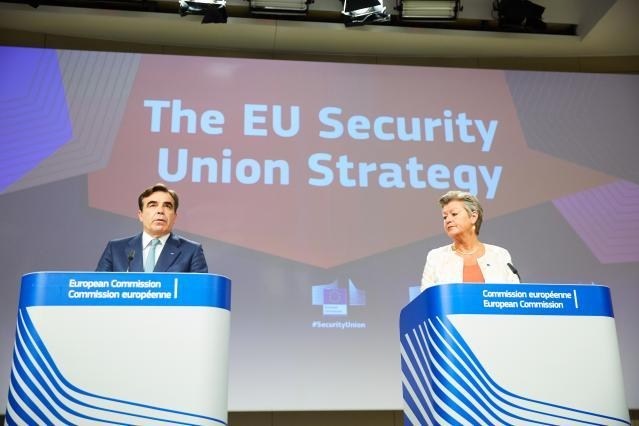The European Commission presented on Friday an EU Security Union Strategy and new initiatives to fight the increase in on-line child pornography, trafficking in drugs and illegal firearms.
The strategy covers the period 2020 – 2025 and lays out the tools and measures to ensure security in both the physical and digital environment. At a virtual press conference today (24 July), Margaritis Schinas, Vice-President for Promoting our European Way of Life, reminded about the terrorist attacks in Brussels and other European cities and said that it was time to close the space for hostile actors.
“Security is a cross-cutting issue which goes into almost every sphere of life and affects a multitude of policy areas. With the new EU Security Union Strategy, we are connecting all the dots to build a real security ecosystem. It is time to overcome the false dichotomy between online and offline, between digital and physical and between internal and external security concerns and threats.”
“This strategy will serve as an umbrella framework for our security policies, which must always be fully grounded in our common values,” he underlined.
Schinas mentioned critical infrastructure where attacks against electricity plants and computer systems can cause huge disruptions because of all interdependencies in society. Recent terrorist attacks have focused on public spaces, including places of worship and transport hubs, exploiting their open and accessible nature.
The strategy includes measures against terrorism, radicalization, cybercrime, hybrid threats and organised crime. Hybrid threats from countries, that do not want “EU to succeed”, aim to weaken social cohesion and undermine trust in institutions, he explained without identifying the countries.
Organised crime comes at huge costs for the victims, as well as for the economy, with €218 to €282 billion estimated to be lost every year. More than a third of organised crime groups active in the EU are involved in trafficking illicit drugs. Organised crime groups and terrorists are also key players in the trade of illegal firearms
Besides the security strategy, the Commission presented a EU Agenda on Drugs, an EU Action Plan against firearms trafficking and an EU strategy against child sexual abuse.
Ylva Johansson, Commissioner for Home Affairs, said that child sexual abuse has increased dramatically on the internet. The past few years have seen an increase in reports of child sexual abuse online concerning the EU (e.g. images exchanged in the EU, victims in the EU, etc.): from 23 000 in 2010 to more than 725 000 in 2019, which included more than 3 million images and videos.
The situation has worsened during the coronavirus crisis, where users of child pornography add more child sexual abuse material to get access to old material on the internet. Two thirds of the websites are hosted in the EU.
The situation concerning illicit firearms is also worrying. It is estimated that 35 million illicit firearms were owned by civilians in the EU in 2017. That makes 56% of the estimated total of firearms. According to those estimates, illicit firearms would outnumber legally-held firearms in twelve EU member states
Johansson highlighted also that Europe has become an “epicenter” for drugs, where illegal drugs are not only consumed but also produced and exported. A significant production of cannabis and synthetic drugs takes place within the EU.
The Brussels Times asked her if there are loopholes in current legislation which allow on-line trade with narcotics and prescription drugs.
She admitted that that there has been an increase in the use of regular mail to send drugs. “We are looking on all parts of the market for drugs, including prescription drugs. It cannot be excluded that there is need for new legislation but this is work for every country to ensure. What we can contribute on EU-level is to increase police cooperation and to find the loopholes.”
M. Apelblat
The Brussels Times

